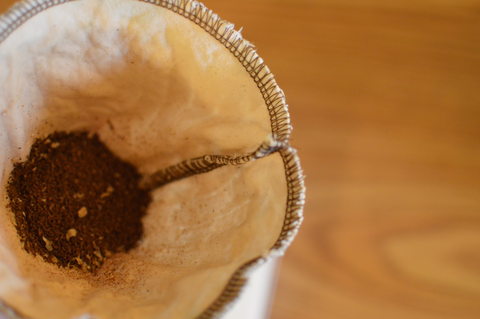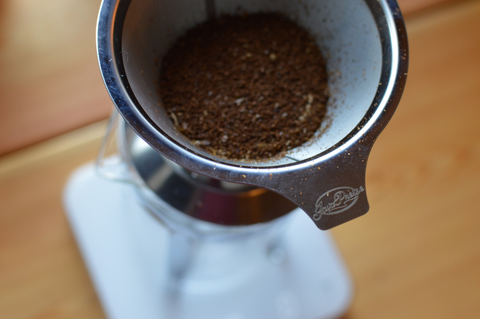Not all coffee filters are made equal. The type you choose for your daily coffee ritual can have a big impact on your overall coffee experience. The aromas, the body, the acidity, the way the flavors blend together - all of these things can be impacted by your coffee filter type.
By understanding how the different coffee filters work, you can make informed decisions about how you would like your coffee to taste at home and while you’re out at coffee shops. You want to know which coffees will best suit your taste preferences, right? Then learn the basic filter types!
But it goes beyond the sensory experience. Each coffee filter type impacts your brewing routine slightly differently, so there’s probably one that suits your values and lifestyle more than the others.
Let’s jump right into the different coffee filter types - paper, cloth, and metal - so that you can get a good look at which one will best suit your taste preferences and lifestyle.
Paper Coffee Filters
Paper filters are what you probably think of when it comes to making coffee. They line the shelves of supermarkets, are never far from drip coffee pots, and can be found in the cabinets of most homes.

Paper filters are tightly woven and absorbent, filtering out most of the oils and micro-grounds. This is a good and a bad thing.
On one hand, the absence of oils and micro-grounds produces a thinner, more approachable drink that’s free of sediment. However, the coffee loses a lot of flavors and aromas without those things present, and the lack of microscopic grounds tends to make the acids seem more pronounced and strong (even though they’re not actually stronger - it’s a perception thing).
Read: How To Learn To Taste Coffee!
Paper filters used to be the most common coffee filters because people generally drank bad coffee (richly flavorful and balanced coffee is more modern than most realize). Many coffee drinkers found that paper filters would make the coffee thinner and more bearable.
Thankfully, excellent coffee is much more common than it used to be and paper filters aren’t as necessary as they once were. Still, paper filters are still the preference of many who enjoy the light, crisp, bright, and clean experience that paper filters provide.
As far as cleanup goes, paper filters are extremely easy. You simply drop the entire filter, coffee grounds included, into the trash or compost. While it’s convenient, it also produces paper waste - and a lot of it.
Paper Coffee Filters In A Nutshell
- Flavor Profile: light, crisp, bright, clean
- Cleanup: quick, convenient
- Waste: high
Metal Coffee Filters
Metal coffee filters brew coffee on the complete opposite end of the spectrum compared to paper coffee filters. Since there’s no finely weaved paper to absorb the natural oils or catch the microscopic grounds, some of these things end up in your final mug.
It may sound a little weird that you drink micro-grounds and oils when you enjoy a cup of coffee made with a metal filter. Allow me to explain.
Coffee’s natural oils are responsible for the majority of the aromas that coffee can have - over 800 of them! These oils are barely noticeable texture-wise, but they contribute a huge amount to the overall flavor experience. Many flavors are only possible when coffee oils are present, including blueberry, rose, and many other lighter, sweeter flavors.
Micro-grounds thicken the mouthfeel of your coffee, but not in a weird gross way. Instead of feeling pure and clean, your coffee will just feel slightly heavier. These grounds don’t exactly reduce the acidity of your coffee, but they do cause your taste buds to not perceive them to be so strong, intense, and biting.
Sometimes a thin layer of micro-ground sediment forms at the bottom of your mug with metal filters. This is completely harmless and makes for a flavor-packed sip - but don’t feel like you have to drink this layer if you’re not fond of the texture.
Cleaning metal filters isn’t the easiest thing, but they can last a lifetime (or two) if you take care of them, which means zero paper waste. The process of cleaning metal coffee filters isn’t cumbersome, but you should check it out for yourself.
Metal Coffee Filters In A Nutshell
- Flavor Profile: aromatic, bold, rich, heavy
- Cleanup: 30 to 60 seconds
- Waste: zero
Cloth Coffee Filters
Cloth coffee filters are the least common filters among the three - at least in North America - but they’re no less incredible. The finely weaved cloth catches all of the coffee grounds, even the micro grounds, but barely absorbs and coffee oils.

The result is a clean, sediment-free cup with rich aromatics from the oils and a high perceived acidity. Sometimes the oils produce a medium mouthfeel.
Cloth coffee filters are a good middle ground flavor-wise between paper and cloth, but they’re difficult to maintain. If you decide to go with cloth filters, you’ll need to make sure you wash them very well between brews and don’t let them dry out too much or stay too moist.
These filters tend to last a few dozen brews before they start to contribute off flavors to your coffee from the trapped oils and micro-grounds of past brews, but they’re technically safe to use for over 100 brews most of the time.
Cloth Coffee Filters In A Nutshell
- Flavor Profile: aromatic, clean, bright, medium body
- Cleanup: 30 to 60 seconds
- Waste: minimal
Read: 5 Ways To Up Your Coffee Game
Which One Is Right For You?
Now that you’ve seen the rundown of the different coffee filter types, it’s time to choose the one that best fits into your lifestyle and compliments your flavor preferences.
Do you love a bright, crisp acidity with your coffee or need your morning routine to be more convenient than anything? Paper coffee filters sound like they may suit you the best.
Do you enjoy a richly aromatic mug and oily body without the sediment? Cloth filters may be the middle ground you need.
Do you want to experience the most out of your delicious coffee beans with a rich, robust flavor profile or are you very environmentally conscious? Metal coffee filters are right up your alley.
In the end, it’s about what works best for you and helps you thrive.
Happy Brewing!



